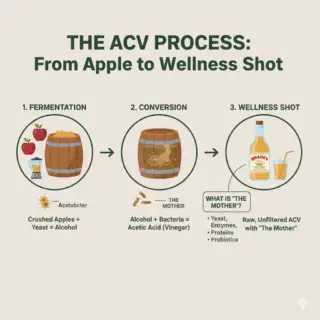Apple cider vinegar (ACV) has been a kitchen staple for centuries, but in recent years, it has exploded in popularity as a supposed miracle solution for everything from gut health to a shining complexion. Perhaps no claim is more widespread, however, than its purported ability to melt away stubborn pounds. With countless influencers and health gurus touting its benefits, it's easy to wonder: Does this tangy elixir, especially the popular Bragg's brand with "the mother," really live up to the hype for weight loss?
This guide cuts through the noise and provides an evidence-based look at the science behind apple cider vinegar and its effects on your body. We’ll explore what the research says, highlight other potential health benefits, and give you a clear, honest answer about its role in your weight loss journey.
What Exactly is Apple Cider Vinegar?
To understand its potential, it is helpful to know what ACV stands for. It’s a vinegar made from fermented apples. The process has two main steps:
-
Fermentation: Crushed apples are exposed to yeast, which ferments the sugars into alcohol.
-
Conversion: Bacteria, often Acetobacter, are added to the alcohol, which further ferments it into acetic acid—the primary active compound in vinegar.
The Bragg's brand is famous for containing a murky, web-like substance known as "the mother." This is a combination of yeast and bacteria that forms during fermentation and is believed by some to be the source of many of ACV’s health benefits, including a healthy dose of probiotics.

The Claim: How ACV is Supposed to Help You Lose Weight
Proponents of ACV for weight loss suggest it works through several mechanisms:
-
Appetite Suppression: Acetic acid is said to make you feel fuller for longer, which can lead to consuming fewer calories throughout the day.
-
Metabolism Boost: It’s claimed that ACV can increase the rate at which your body burns fat.
-
Blood Sugar Regulation: ACV may help to stabilize blood sugar levels, which can prevent the insulin spikes that lead to fat storage.
But do these claims hold up to scientific scrutiny? Let's take a look at what the research has found.
What the Science Says: The Evidence-Based Truth
While studies on ACV are limited and often small in scale, the results are intriguing. They suggest that ACV may indeed offer some benefits, but it is far from a magic bullet.
1. Blood Sugar Regulation and Insulin Sensitivity
This is where the strongest evidence for ACV's benefits lies. Multiple studies have shown that consuming ACV with a high-carb meal can significantly improve insulin sensitivity and lower blood sugar spikes after eating.
-
A study published in the Journal of Diabetes Research found that consuming ACV before a meal improved post-meal glucose and insulin levels in people with type 2 diabetes.
-
Another small study in the European Journal of Clinical Nutrition showed that ACV can reduce the blood sugar response after eating a slice of bread.
How does this relate to weight loss? When your blood sugar levels are stable, your body is less likely to produce large amounts of insulin, a hormone that promotes fat storage. This can help prevent unwanted weight gain and may make it easier to lose weight over time.
2. Satiety and Calorie Intake
There is also some evidence that ACV can help you feel full, though the mechanism is a bit unusual.
-
A Japanese study published in Bioscience, Biotechnology, and Biochemistry followed 175 obese individuals over 12 weeks. The subjects who consumed 15ml of ACV daily lost an average of 2.6 pounds, while those who consumed 30ml lost 3.7 pounds. The control group, which drank a placebo, gained weight.
-
However, other studies suggest that ACV’s appetite-suppressing effect may be a result of the feeling of nausea or indigestion it can cause when consumed in high doses.
The Verdict: While the Japanese study is promising, the weight loss was modest. ACV on its own won't lead to significant weight loss, but it could potentially serve as a small aid to a healthy diet.
Other Health Benefits of Apple Cider Vinegar
Beyond its role in weight management, Bragg's ACV is celebrated for several other potential benefits:
-
Heart Health: Some animal studies suggest ACV can lower cholesterol and triglyceride levels, though more human research is needed.
-
Antimicrobial Properties: ACV has been shown to kill pathogens, including bacteria. Its traditional use as a disinfectant and food preservative is well-documented.
-
Skin and Hair Care: When diluted, it can be used as a natural toner to balance skin pH or as a hair rinse to add shine and reduce dandruff.

How to Safely Use ACV and Avoid Side Effects
If you choose to incorporate ACV into your routine, do so with caution. High acidity can be harmful.
-
Always dilute it: Never drink undiluted ACV. A common dose is 1-2 tablespoons mixed with at least 8 ounces (240ml) of water.
-
Protect your teeth: The high acid content can erode tooth enamel. It’s best to drink it through a straw and rinse your mouth with plain water afterward.
-
Watch for side effects: Overconsumption can lead to digestive issues, a sore throat, and a burning sensation in the esophagus.


The Bottom Line: Is ACV a Magic Weight Loss Cure?
No, apple cider vinegar is not a magic cure for weight loss. The scientific evidence suggests that it is not a standalone solution and should never be seen as a substitute for a balanced diet and regular exercise.
However, studies show it can play a helpful, complementary role, particularly by helping to stabilize blood sugar levels and, to a lesser extent, promoting a feeling of fullness. Think of it as a helpful player on a team, not the star quarterback. If you’re looking to lose weight, the most effective strategies remain a healthy, calorie-controlled diet and a consistent exercise routine.
Before making any significant dietary changes, especially if you have an underlying health condition like diabetes, it is crucial to consult with your doctor or a registered dietitian. They can provide personalized advice and ensure any new regimen is safe and effective for you.










I needed to thank you for this wonderful read!! I absolutely loved every bit of it. I have got you book marked to look at new stuff you